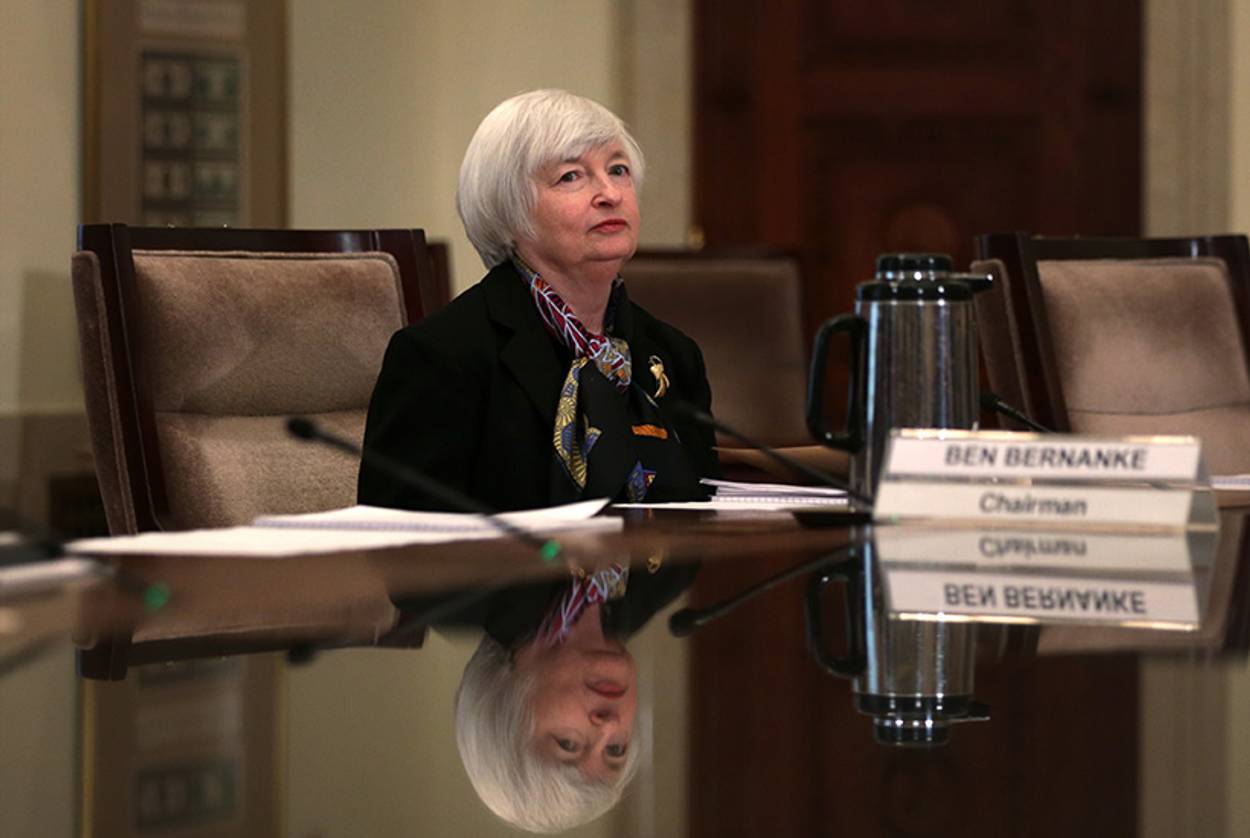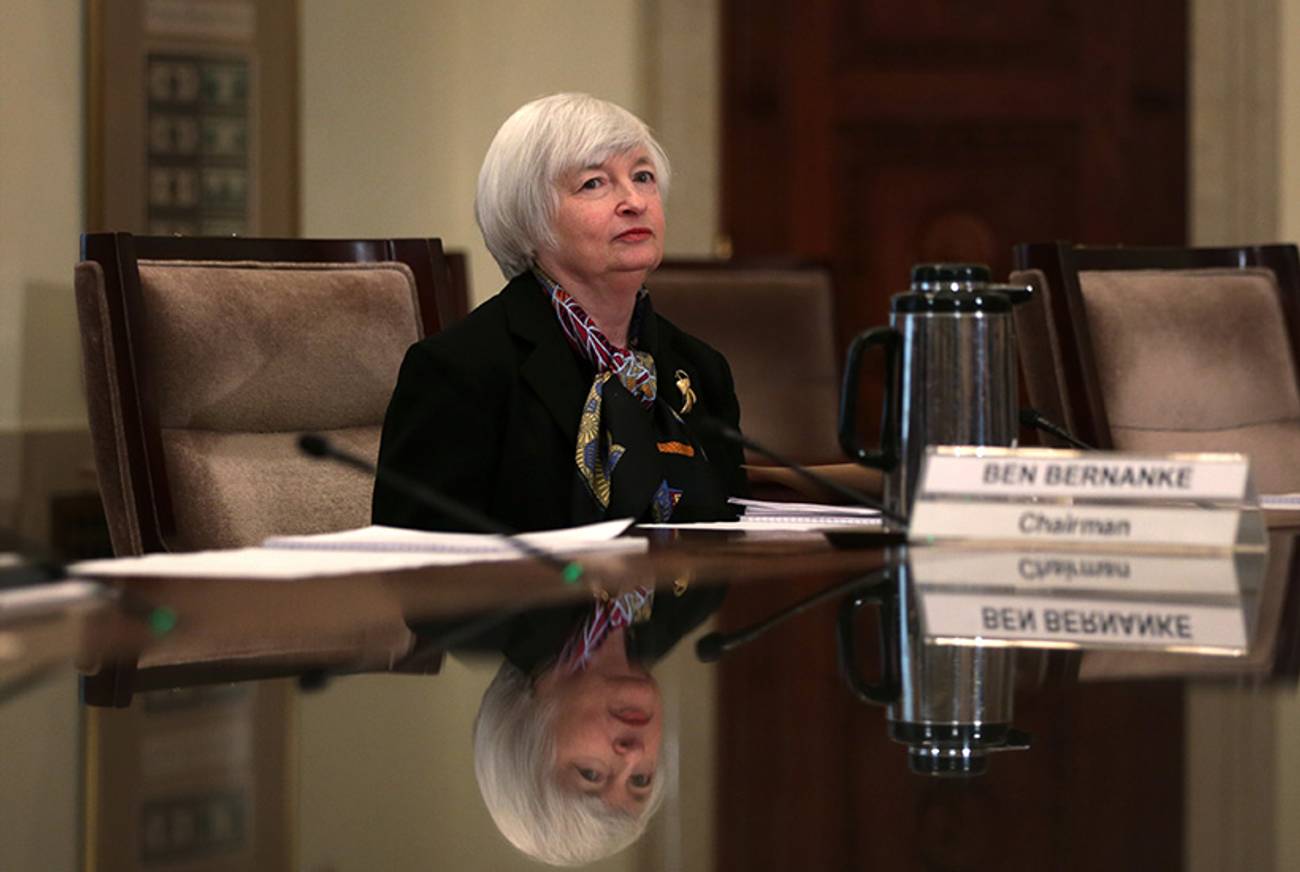Janet Yellen Is Poised To Be the Third Jewish Fed Chair in a Row. Where Are the Anti-Semites?
Decades ago, her predecessor Eugene Meyer was targeted as a ‘moneylender’—but now Jews are celebrated for financial prowess




Sometime this week, Janet Yellen is expected to be confirmed by the Senate as chairman of the Federal Reserve. When that happens, she’ll become one of the most powerful people in the world, and one of the most powerful women—some have argued the most powerful woman—in history.
Yellen’s ascent to the post will also guarantee that, by the end of her first term, Jews will have occupied the Fed’s top post for three decades straight – an unprecedented run of Jewish power and influence. The chairman’s seat hasn’t been occupied by a non-Jew since 1987, when Alan Greenspan was appointed by President Ronald Reagan to follow Paul Volcker. With the succession of Ben Bernanke in 2006, under President George W. Bush, and now the appointment of Yellen by President Barack Obama, it’s worth remembering that there is a concept in Jewish thought called chazakah: When something happens three times, it can be considered permanent. Applied to the Federal Reserve, it would suggest an impossibly firm grasp on a degree of power the likes of which the Jewish people have never known.
Of course, the idea of a somewhat secretive cabal of Jews manipulating the levers of global finance is pretty much exactly the paranoia that has animated the most virulent anti-Semitic conflagrations of the past. And now, we have not just Yellen in the picture, but also Stanley Fischer, the Rhodesia-born banker who served as head of Israel’s central bank and is now rumored to have been picked to fill Yellen’s place as vice chair of the Federal Reserve.
And yet, despite this historic Jewish run, anti-Semitic conspiracies about Jewish control of the world banking system seem, if anything, less common than they once were—all the more surprising because the degree of influence American central bankers have in the global financial system today surpasses anything the Rothschild tycoons were able to maintain at the height of their influence. Every time the Federal Reserve issues its thoughts about the future of the American economy, or tweaks an interest rate by a fraction of a percent, or adjusts its bond-buying program, it immediately alters trillions of dollars’ worth of transactions all around the globe. There are subsistence rice farmers in rural China who are affected by the Fed’s decisions along with Wall Street traders.
And with the Fed consistently lowering interest rates to goose the American economy—especially in the last three years under Bernanke, with Yellen as his vice chair—plenty of countries have legitimate reason to object to the bank’s actions. Germany’s selling us fewer small appliances, Vietnam’s selling us fewer cashews, and Korea’s selling us fewer electronics than they otherwise would if the Fed weren’t engaging in competitive devaluation of the dollar.
And that’s just one side of the equation. On the other side, the Fed’s policies are boosting the competitiveness of our exports. So, farmers everywhere are getting undersold to a greater degree by American soybeans and corn. Our Boeing airplanes are relatively cheaper than Europe’s Airbus craft. We’re dumping product everywhere, even gasoline, which we now export more of than we import.
You’d think all that would keep the leaders of Jewish defense groups awake with nightmares. So, why aren’t we seeing laid-off agricultural workers with pitchforks, and assembly-line workers with pneumatic air guns, and electronics manufacturers with soldering irons lining the streets, protesting their unemployment at the hands of America’s Jewish central bankers?
***
The first Jewish chair of the Federal Reserve was appointed in 1930, just after the stock market crash of 1929. The American economy had started on its downward slide toward the Great Depression, and anti-Semitism and racism were on the upswing thanks to radio preachers like Father Coughlin and groups like the Ku Klux Klan.
Eugene Meyer was an investing heir who rejected his father’s firm to make his own mark by purchasing a seat on the New York Stock Exchange. The first president he worked for was Woodrow Wilson, who tapped Meyer to lead the War Finance Corporation during WWI. Calvin Coolidge subsequently placed him atop the Federal Farm Loan Board, and Herbert Hoover made him chair of the Federal Reserve.
He had the political misfortune to take over the Fed just as the country was heading into its worst and most enduring economic crisis. Under his leadership, the Fed oversaw rapid deflation, which dried up domestic spending and exports. He resigned when Franklin Delano Roosevelt took office in 1933, before the end of his term—but not before becoming the only Fed chair ever to have articles of impeachment introduced against him, by the notoriously racist, anti-Semitic and reactionary Congressman Louis Thomas McFadden, a Republican from Pennsylvania.
McFadden inveighed against Meyer’s Fed in a 25-minute speech delivered on the House floor in 1932, replete with conspiracy theorizing:
Some people think the Federal reserve banks are United States Government Institutions. They are not Government institutions. They are private credit monopolies which prey upon the people of the United States for the benefit of themselves and their foreign customers; foreign and domestic speculators and swindlers; and rich and predatory money lenders. …
Those 12 private credit monopolies were deceitfully and disloyally foisted upon this country by bankers who came here from Europe and who repaid us for our hospitality by undermining our American institutions. Those bankers took money out of this country to finance Japan in a war against Russia. They created a reign of terror in Russia with our money in order to help that war along. They instigated the separate peace between Germany and Russia and thus drove a wedge between the allies in the World War. They financed Trotsky’s mass meetings of discontent and rebellion in New York. They paid Trotsky’s passages from New York to Russia so that he might assist in the destruction of the Russian Empire. They fomented and instigated the Russian revolution and they placed a large fund of American dollars at Trotsky’s disposal in one of their branch banks in Sweden so that through him Russian homes might be thoroughly broken up and Russian children flung far and wide from their natural protectors. They have since begun the breaking up of American homes and the dispersal of American children.
The speech concluded with a more direct reference to the nature of those McFadden felt were consuming the world in financial conspiracy: “Faithless Government officers who have violated their oaths of office should be impeached and brought to trial. Unless this is done by us, I predict that the American people, outraged, robbed, pillaged, insulted, and betrayed as they are in their own land, will rise in their wrath and send a President here who will sweep the money changers out of the temple.”
It bears repeating: This was a speech delivered on the House floor. The congressional record notation of what occurred immediately after that last sentence was “[Applause.]” (McFadden also distinguished himself by placing the entire Protocols of the Elders of Zion into the congressional record.)
Greenspan, Bernanke, and Yellen have never faced anything like the anti-Semitic tirades that Meyer endured. And the sense of everyone being OK with Jewish bankers isn’t restricted to the United States: Even as anti-Semitism flares up in Romania or Bulgaria or Iran, it hasn’t been targeted at these central bankers.
It’s not because the Fed has lost its allure as a target of populist malcontent. Ron Paul, the former Texas congressman and erstwhile Republican presidential candidate, declared after winning the Iowa caucuses in 2012, “We’re all Austrians now!” He was not referring, of course, to the Nazis who stomped on my ancestors, but to the Austrian economists he loves: figures like Friedrich Hayek and Ludwig von Mises, whose theories are interpreted by Tea Party enthusiasts as arguments against the expansionary monetary policy wielded by the Fed and other central banks.
Nor is it because Israel has replaced bankers as the chief object of international anti-Semitic conspiracy-mongering. Indeed, perhaps the most famous and notorious anti-Semite of the contemporary era, former Iranian President Mahmoud Ahmadinejad, famously threatened to wipe Israel off the map. But it’s silly to suggest that anti-Semites can’t target the Fed because they have a bandwidth problem: Ahmadinejad also hosted Holocaust denial conferences, which suggests a hunt for extra outlets for expressing his anti-Semitism.
It seems, rather, that the perception about Jews and money may have actually been inverted—a phenomenon we see most clearly in Asia, the region where Jews are least present. As many anecdotal examples from Asia’s modernizing economies have shown, Jews are almost a mythical people there; see, for example, this excellent video the JTA produced in 2008 asking people in Beijing what they thought of Jews. South Korean executives look to the Talmud for business lessons, and last year, a Chinese business owner set out to improve his company’s international credibility by hiring a Jew, preferably one with a degree from Harvard or Yale.
These countries are interesting because they’re rare examples of places on earth where Jews haven’t been demonized, persecuted, or slaughtered en masse, though there weren’t ever enough Jews around to be worth the trouble. And yet, the longstanding story of Jewish competence in areas of finance and commerce has pervaded popular culture and been turned on its historic head, to the point where some firms feel the need to hire Jews and millions of people try to find the secrets to worldly success in ancient Jewish texts. It’s clearly the kind of anti-Semitism that the ADL would call out, and yet it’s also just as clearly devoid of the kind of violent intent or nostalgia for violence that we’re so used to.
So, what does all this mean for Janet Yellen? She’ll be allowed to do her job, and however she fares, she won’t have to worry about whether her performance is good or bad for the Jews—just about whether it’s good or bad for everyone.
***
You can help support Tablet’s unique brand of Jewish journalism. Click here to donate today.
Steven I. Weiss is an award-winning journalist and is news anchor & managing editor at The Jewish Channel. His Twitter feed is @steveniweiss.
Steven I. Weiss is an award-winning journalist and is news anchor & managing editor at The Jewish Channel. His Twitter feed is @steveniweiss.